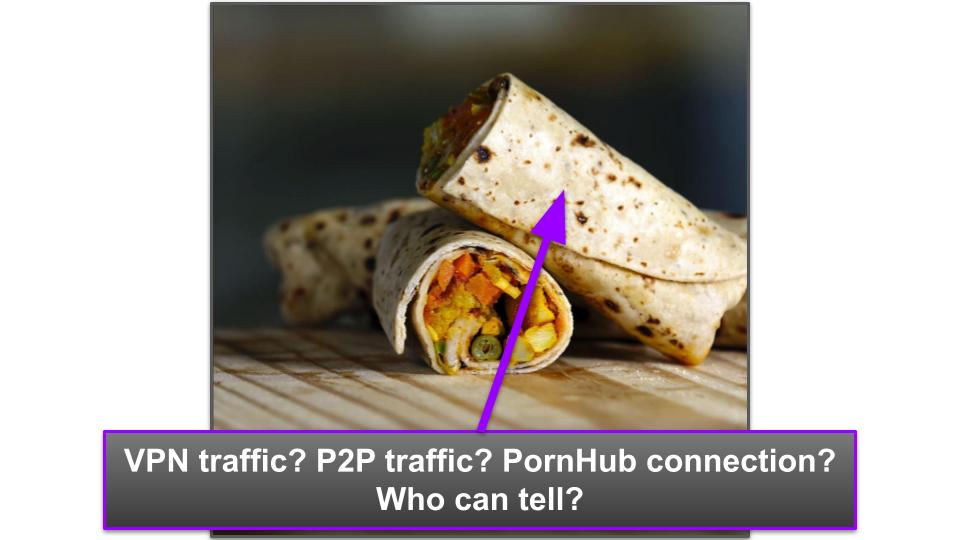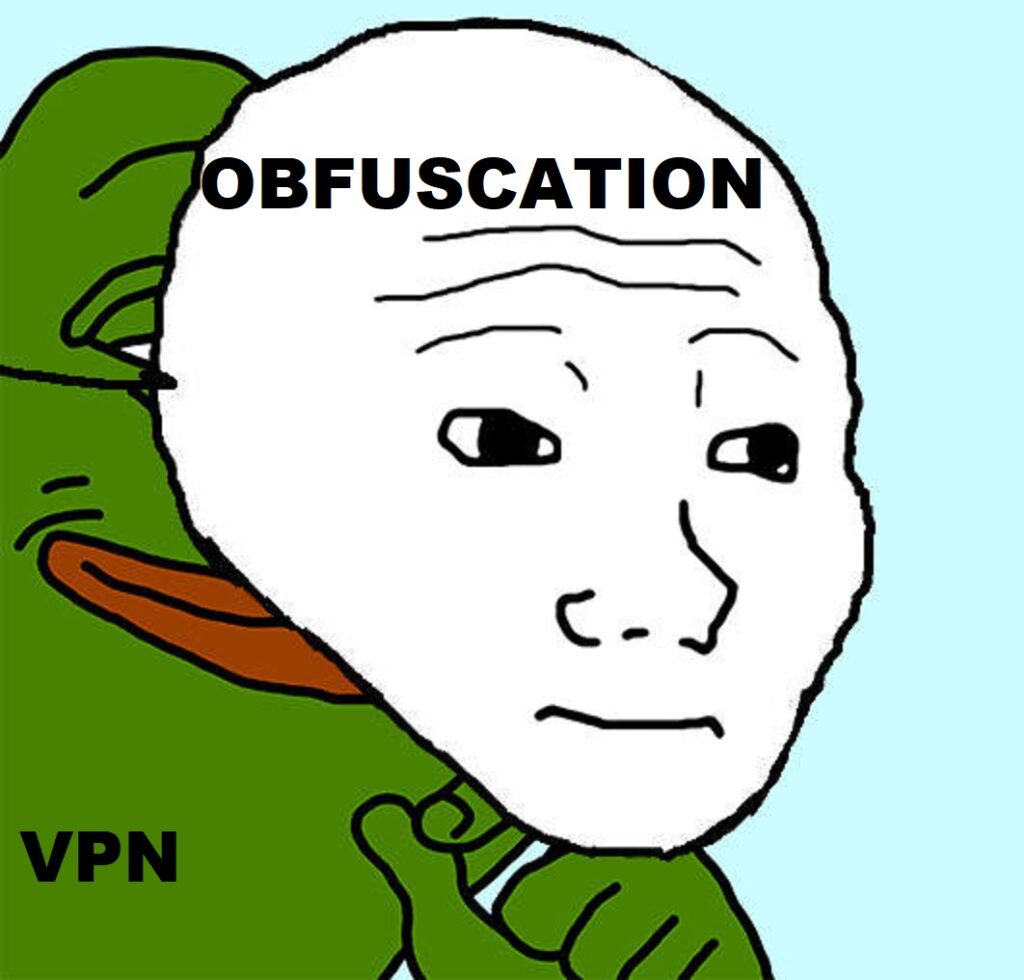No — you should never use a VPN’s obfuscation feature while streaming. It will only cause big slowdowns and it won’t improve your streaming experience at all. The only exception is when you’re trying to stream in a restrictive country that blocks VPNs, like China (but even that’s not guaranteed to 100% work well).
That’s the tl;dr basically. If you want to learn more about how obfuscation works, why you shouldn’t use it for streaming, and when you should use it, keep reading fam.
How Does VPN Obfuscation Work?
VPN obfuscation hides VPN traffic, making it look like normal internet traffic. It does that by adding an extra layer of encryption to the VPN connection, so it essentially “wraps” the VPN traffic in a layer of obfuscation.
If you’d like a visual example, just think of obfuscated VPN traffic as a vegan burrito. The VPN traffic represents the vegan contents of the burrito and the obfuscation is the tortilla wrap — if you look at the burrito, you wouldn’t be able to tell it’s a vegan burrito because it’s wrapped in a layer of tortilla. Similarly, if an ISP tries looking at an obfuscated VPN connection, it’ll just look like a normal internet connection to it.

It’s not the best metaphor, I know, but it at least gets the point across (I hope).
VPNs might use different types of obfuscation methods, but they all do the same thing in the end — prevent anyone from seeing your VPN traffic. I don’t really think there’s a “best” way of obfuscating VPN traffic to be honest. As long as it gets the job done, it’s all gucci.
Why You Shouldn’t Use Obfuscation for Streaming
Because obfuscation simply doesn’t help with streaming — it won’t make it harder for streaming sites to detect and block your VPN connection (I’ve heard way too many people claim this).
That’s because streaming sites don’t block your VPN traffic — they block your VPN IP address. So even if you use obfuscation to hide your VPN traffic from a streaming service, it won’t improve your odds of accessing it.
And here’s something else to consider — streaming sites can’t even detect your VPN traffic. They can’t inspect your connection to detect VPN traffic because your connection isn’t going through the streaming site’s network. Instead, you’re connecting to the streaming site and your connection is going through your ISP’s network. So only your ISP would be able to analyze, detect, and block your VPN traffic.
Basically, your VPN connection to a streaming site looks like this:
Not like this:
And if you ignore that and still use obfuscation for streaming, you’ll have slow speeds. As mentioned above, obfuscation adds an extra layer of encryption to your VPN connection. You’re already dealing with one layer of encryption that slows down your original speeds — add another one on top of that and the slowdown is going to be even more noticeable.
The Only Exception When It Makes Sense to Use Obfuscation for Streaming
The only time it makes sense to do this is when you’re dealing with VPN traffic blocks — namely, when your ISP or network admin is using DPI to detect and block your VPN connections.
This usually only happens in restrictive countries like China, but even there it doesn’t happen all the time.
So you could theoretically use obfuscation for streaming in restrictive countries. Like if you’re trying to access Netflix in China but your VPN connection isn’t working due to DPI blocks.
But even then that use case is pretty niche and unlikely to be honest — when VPNs are blocked in restrictive countries, it’s usually due to IP blocks (ISPs and network admins block the VPN’s server IP addresses), not DPI blocks.
When Should You Normally Use Obfuscation?
As I mentioned above, when you’re dealing with DPI blocks — basically, when an ISP or network admin is using network traffic analysis methods to detect and block your VPN traffic. This might happen in restrictive countries like China or on restrictive networks (maybe at work, school or campus, or government institutions).
You can also use obfuscation when you want more privacy. If you simply don’t want anyone knowing you’re using a VPN, obfuscation would provide you with some peace of mind. Just remember it’s not foolproof — even if someone who inspects your VPN connection can’t see your VPN traffic, they can still see that you’re connected to a VPN IP address.
What Should You Use Instead of Obfuscation While Streaming Then?
There’s no specific security feature to use — it all just depends on the VPN IP refresh rate. As long as the VPN provider is refreshing its server IP addresses very often, streaming sites can’t detect and block them fast enough. For example, if Netflix updates its VPN IP blocklist every week, a VPN would need to refresh its server IPs every week or few days to avoid getting blocked by Netflix.
So it basically all comes down to using a good streaming VPN. There are tons of them out there, and I have a list of the best ones (in my opinion) here.
Of course, certain VPNs have specific features that improve streaming. For example, Surfshark has IP Rotator, which changes your VPN IP addresses at regular intervals without dropping your VPN connection — this might make it harder for streaming services to block your VPN connection. And many VPNs have smart DNS tools that let you enjoy streaming content on devices that don’t work with VPN apps. If you’re having trouble accessing a streaming site via a VPN connection, you might have better odds of accessing it via a smart DNS connection.
Do VPNs Use Obfuscation By Default?
No, most VPNs require you to enable obfuscation or connect to obfuscated servers. Otherwise, you’ll just use a normal VPN connection. Each vendor does things differently, so I can’t tell you how to enable obfuscation for every VPN — though it’s usually really simple to do.
One exception to this is ExpressVPN — it automatically uses obfuscation by default across all of its servers and VPN protocols. This is something tons of ExpressVPN support reps have confirmed to me over the past years. That’d normally mean its speeds would be much slower, but that’s actually not the case, so hooray for that. So if you still insist on using obfuscation for streaming, at least stick with ExpressVPN because your speeds will be good + the VPN is great for streaming (it works with 100+ streaming services).
What the Hell’s Up With the Featured Image?
Didn’t really know what relevant image to add, so I just used this one:

Unfortunately, the preview cropped the most important parts lol. But you can view it in all of its glory here.
